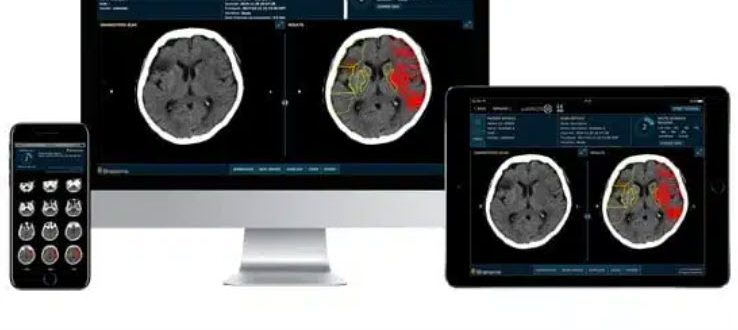Artificial Intelligence may have many downsides, but that’s certainly not the case in stroke treatment: in England, it has tripled the proportion of stroke patients who fully recover. Nearly half of stroke patients now recover to the point of functional independence, up from 16 percent.
This AI tech, which aids in the rapid analysis of brain scans, has significantly accelerated the diagnosis and treatment pathway, demonstrating how digital innovation can profoundly impact clinical outcomes. The key to this success lies in expediting the time-critical decisions necessary to administer reperfusion therapies like thrombectomy or thrombolysis.
The picture above shows on the left of each screen what 90% of doctors see using CT scans, versus the right hand side screen which shows the new technology, which identifies the problem areas automatically using the ASPECTS score card method,
One of the pivotal studies cited by NHS England involved the Brainomix e-Stroke system. This AI software was used in pilot programs across five stroke networks and has now been deployed to all 107 stroke centres in England.
Analysis of its impact showed a dramatic reduction in the time from hospital arrival to treatment, from an average of 140 minutes down to just 79 minutes. This crucial time-saving, which is critical since a stroke patient can lose millions of brain cells every minute, led to a proportional increase in positive outcomes. The proportion of patients who recovered with little or no disability soared from 16% to 48%, a threefold improvement.
The AI’s ability to provide rapid, real-time interpretation of brain scans allows specialist stroke units to make faster, more confident decisions regarding the most appropriate treatment, ultimately providing more patients with a better chance of recovering their independence.
In practice, the AI software rapidly processes CT brain scans and produces detailed reports for clinicians. These reports, including perfusion maps that highlight areas of reduced blood flow, are instantly shared across the clinical team via a secure platform. This streamlined communication and immediate insight allow for swift and coordinated action, reducing the critical time between diagnosis and the start of treatment.
The technology’s success has not only been evidenced in official reports but also validated by patient testimonials, such as that of Mr. Shawn Theoff, a retired postman from Canterbury who experienced a rapid recovery from a stroke thanks to the use of AI-enhanced diagnosis and treatment at Kent and Canterbury Hospital. He was taken to the hospital after experiencing stroke symptoms, where AI-powered decision support tools helped doctors quickly diagnose his condition and administer medication, leading to a swift recovery that saw him walking again within a few weeks.



